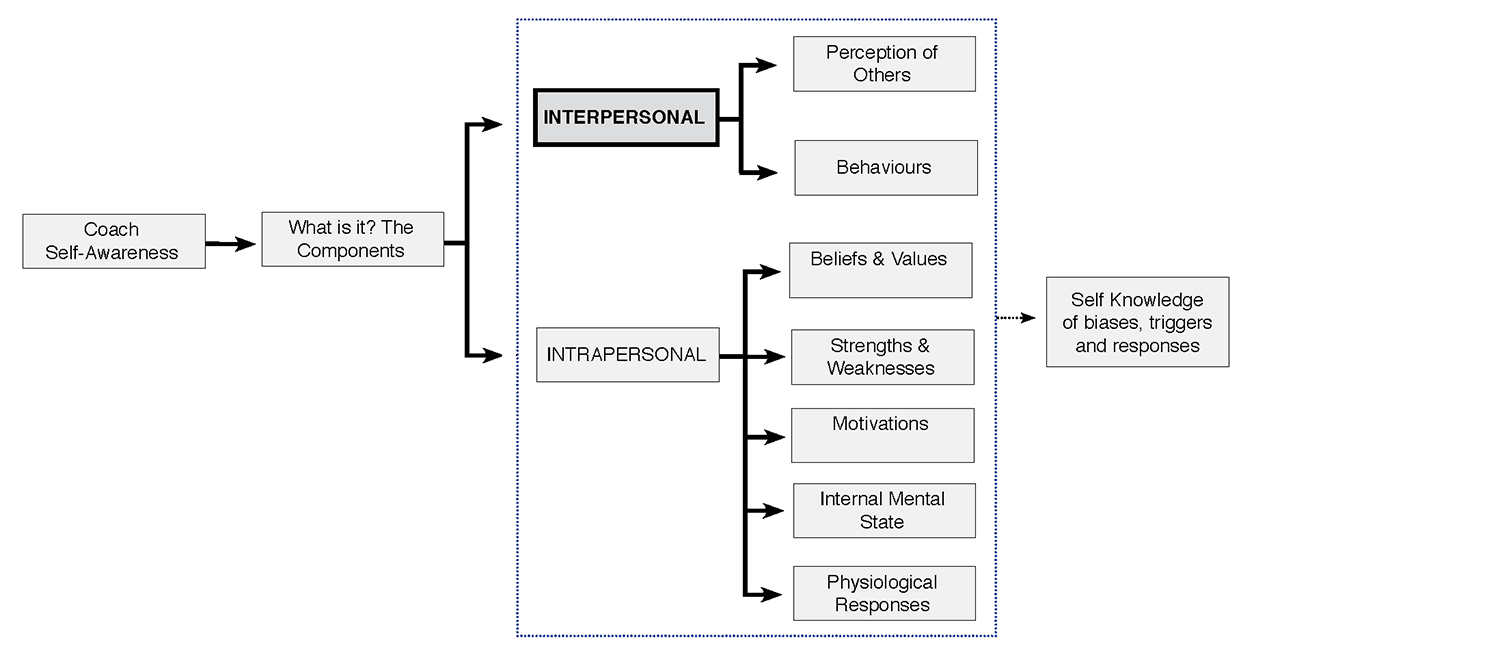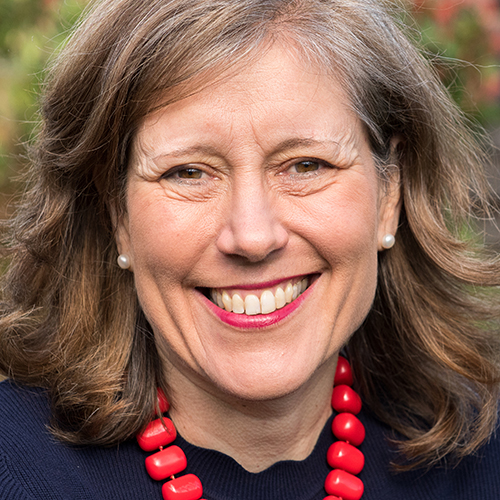
12 December 2023
Dr Julia Carden discusses her research into the role of self-awareness in the development of the executive coach.
I have long had a fascination with self-awareness, and what the Johari window labels the ‘unknown/unknown quadrant’. When designing and running leadership programs, I assessed self-awareness, but started to question it. I wanted to gain clarity on what self-awareness meant. However, despite there being some consensus that self-awareness is essential if coaches are to be effective in initiating behavioural change, many coaches have not participated in in-depth personal development.
Unlike therapy and counselling training and accreditation, the in-depth development of coach self-awareness is not a requirement of coach training, or of the professional bodies. Granted, the EMCC includes coach self-awareness as a standalone competency, but it is just one marker within ‘embodies a coaching mindset’ in the ICF competency framework. This led me to question if self-awareness should be a bigger and perhaps even primary focus of coach education and training programmes.
Defining self-awareness
What became very clear early on was that while self-awareness is a popular term that is frequently used in leadership development, and is associated with emotional intelligence and greater performance, the term is not well-defined. It has multiple connotations, and is frequently confused with self-knowledge and self-consciousness.
This caused me to notice that while I thought I had been developing self-awareness, how could I have been if I did not have a clear definition of what it was that I should be or might be developing. Therefore, I set out to define self-awareness within the context of adult development, and then more specifically for coach development and coaching.
I concluded that:
‘Self-awareness consists of a range of interpersonal (the perception of others and individual behaviours) and intrapersonal components (beliefs, values, strengths, weaknesses, motivations, internal mental state and physiological responses) in order to develop self and client connection, to enable coaching conversations with insight and change.’
The diagram below provides clarity on what the components of self-awareness are, and how it supports coaching practice.


I found identifying the granularity of each of the components helpful in supporting me to identify where I needed to do some work.
The first stage in developing self-awareness is to know and understand what the components and layers of it are. It is also important that we are motivated to develop it and then we need to initiate a process of self-questioning and reflection. There is no one way or quick fix in developing self-awareness, and it can develop in multiple ways through multiple methods – the key is to get curious and interested.
There is a challenge in terms of developing the interpersonal components of self-awareness as this requires feedback from others, which can initiate our ego-defences and storytelling – that is, justifying why the feedback is being given. This is where coaching supervisors have an important role, particularly if you have deep trust and strong psychological safety when working with them. Your supervisor can then offer feedback about your impact on them and what they are noticing in a way that can be palatable and therefore integrated into your development of self. In terms of seeking to develop the interpersonal components of receiving feedback, if you notice yourself wanting to disagree with or ignore the feedback, then perhaps challenge yourself to be curious – there is possibly some new insight to be gained.
By considering both the interpersonal and intrapersonal components of self-awareness, we can gain clarity on the distinctions between self-consciousness, self-knowledge and self-awareness. Self-consciousness is the intrapersonal element of self-awareness, whereas self-knowledge is the result of us becoming more self-aware. By becoming more self-aware, we acknowledge our biases, responses and judgments which we can then manage or use consciously in our practice.
This is important because we are developing self-awareness in service of our practice, because if we were doing it for our own self-gratification, it might be considered, as one of my research participants highlighted, to be somewhat narcissistic.
Take-away – How can we, as coaches, possibly develop our own self-awareness if we do not know what it is? Therefore, aim to get clarity on each of the components and levels of self-awareness.
How does self-awareness contribute to your coaching practice?
We are all aware that we are the main tool or instrument of coaching and this is endorsed by earlier work by Tatiana Bachkirova. Self-awareness provides a deep knowledge of who we are, and a route to using ourselves fully in service of our clients. My research identified that self-awareness provides coaches with the route to human connection, the relational aspect that is so essential to coaching. While this is perhaps unsurprising, I discovered that this human connection is made up of two elements: self-connection and client connection, with the route to client connection through self-connection.
In fact, we can only develop client connection after self-connection. This means that we cannot develop human connection until we have accepted ourselves. Once we have done this deeper work on ourselves in terms of self-connection, we can then be in full service of our clients, and work at a deeper level of insight and change. This is because we can sit with our clients in a space of uncertainty and difficulty, without having to resolve the problem or find a solution. It is a route to get comfortable with the discomforts we can face when working with our clients. In addition, we can only take our clients as deep as we have taken ourselves. Therefore if we wish to work at a level of insight and change, this self-awareness work is essential.
In summary, self-awareness is a complex construct made up of multiple components, and it is not fixed. Instead, it is a dynamic construct that is changing and evolving constantly. Developing it in service of our coaching practice takes conscious effort, as it is an ever-evolving construct that needs ongoing work. I suspect that once we start thinking we are self-aware, we have transitioned to hubris! An area for further research perhaps?
Questions for practitioners
- How might you develop your self-awareness? What further work is required? How might you work with your coaching supervisor to do this work?
- Which of the components of self-awareness have you neglected to date? Which ones might you put some effort in?
- What are you curious about in terms of how you operate as a coach?
- What other questions might you pose to support you in this work?
- What personal and professional development will support you in this work?
- How might you include ongoing work on your self and self-awareness in your development plans?
- What might you take to your coaching supervisor to deepen your practice?
Questions for coach educators
- To what extent are you including coach self-awareness in coach training?
- How might you educate those in training as to what self-awareness actually is? And why it is important to coaching practice?
- What elements of your coach education support the development of coach education?
- What more might you do?
Implications for coaching supervisors
- How might getting clearer on the components of self-awareness support your work as a coaching supervisor?
- How might you ensure your clients are developing self-awareness and are not self-delusional?
- How might you create an environment where you can share how you are experiencing your clients in service of developing their self-awareness?

About Dr Julia Carden
Julia is a coach and coaching supervisor who works with a diverse range of leaders in the public and private sectors. Her work focuses on working with individuals and teams to take off their blinkers to expand and deepen self-awareness. Alongside her coaching and supervision practice she is a visiting tutor at Henley Business School, teaching on the Professional Certificate in Executive Coaching, the MSc in Coaching for Behavioural Change and leading the Professional Certificate in Coaching Supervision.
She is now thinking about how coaching supervision can support (and perhaps hinder) the development of coach self-awareness. Her own development journey is ongoing, and she is passionate about her own CPD, investing in regular coaching supervision (both individual and group) and keeping up to date with a range of webinars. In 2024 she is planning on engaging in yoga, psychotherapy, and enneagram training.
Contact details
Email: [email protected]
Website
LinkedIn profile
Read more
Carden, J., Jones, R.J. and Passmore, J., 2022. Defining self-awareness in the context of adult development: a systematic literature review. Journal of Management Education, 46(1), pp.140-177.
Carden, J., Jones, R.J. and Passmore, J., 2021. An exploration of the role of coach training in developing self-awareness: a mixed methods study. Current Psychology, pp.1-15.
Carden, J., Passmore, J. and Jones, R.J., 2022. Exploring the role of self‐awareness in coach development: A grounded theory study. International Journal of Training and Development, 26(2), pp.343-363.
Photo: Tiago Bandeira